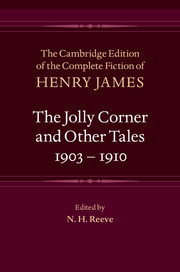Book contents
- Frontmatter
- Contents
- Acknowledgements
- List of Abbreviations
- General Editors’ Preface
- General Chronology of James’s Life and Writings
- Introduction
- Textual Introduction
- Chronology of Composition and Production
- Bibliography
- The Jolly Corner and Other Tales 1903–1910
- Glossary of Foreign Words and Phrases
- Notes
- Textual Variants
- Emendations
- Appendices
I
Published online by Cambridge University Press: 11 April 2021
- Frontmatter
- Contents
- Acknowledgements
- List of Abbreviations
- General Editors’ Preface
- General Chronology of James’s Life and Writings
- Introduction
- Textual Introduction
- Chronology of Composition and Production
- Bibliography
- The Jolly Corner and Other Tales 1903–1910
- Glossary of Foreign Words and Phrases
- Notes
- Textual Variants
- Emendations
- Appendices
Summary
There was a longish period—the dense duration of a London winter, cheered, if cheered it could be called, with lurid electric, with fierce “incandescent” flares and glares—when they repeatedly met, at feedingtime, in a small and not quite savoury pothouse a stone’s-throw from the Strand. They talked always of pothouses, of feeding-time—by which they meant any hour between one and four of the afternoon; they talked of most things, even of some of the greatest, in a manner that gave, or that they desired to show as giving, in respect to the conditions of their life, the measure of their detachment, their contempt, their general irony. Their general irony, which they tried at the same time to keep gay and to make amusing at least to each other, was their refuge from the want of savour, the want of napkins, the want, too often, of shillings, and of many things besides that they would have liked to have. Almost all they had with any security was their youth, complete, admirable, very nearly invulnerable, or as yet inattackable; for they didn't count their talent, which they had originally taken for granted and had since then lacked freedom of mind, as well indeed as any offensive reason, to reappraise. They were taken up with other questions and other estimates—the remarkable limits, for instance, of their luck, the remarkable smallness of the talent of their friends. They were above all in that phase of youth and in that state of aspiration in which “luck” is the subject of most frequent reference, as definite as the colour red, and in which it is the elegant name for money when people are as refined as they are poor. She was only a suburban young woman in a sailor hat, and he a young man destitute, in strictness, of occasion for a “topper”; but they felt that they had in a peculiar way the freedom of the town, and the town, if it did nothing else, gave a range to the spirit. They sometimes went, on excursions that they groaned at as professional, far afield from the Strand, but the curiosity with which they came back was mostly greater than any other, the Strand being for them, with its ampler alternative Fleet Street, overwhelmingly the Papers, and the Papers being, at a rough guess, all the furniture of their consciousness.
- Type
- Chapter
- Information
- The Jolly Corner and Other Tales, 1903–1910 , pp. 56 - 67Publisher: Cambridge University PressPrint publication year: 2017

